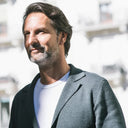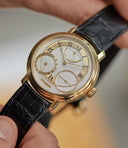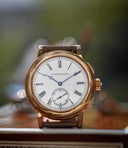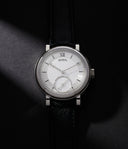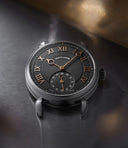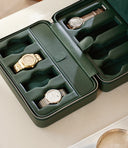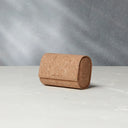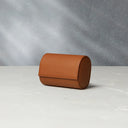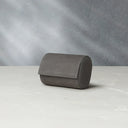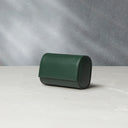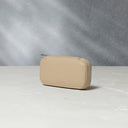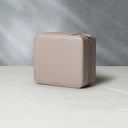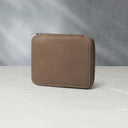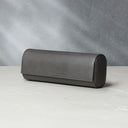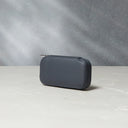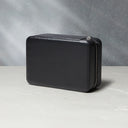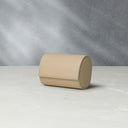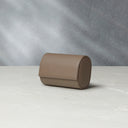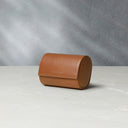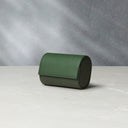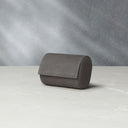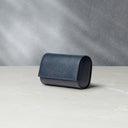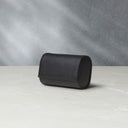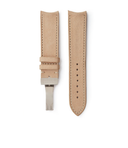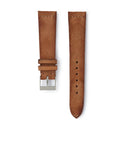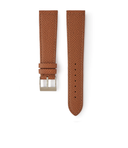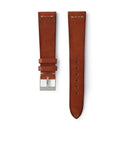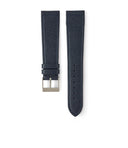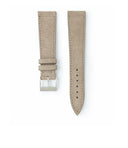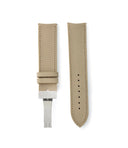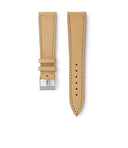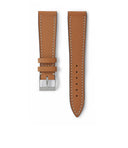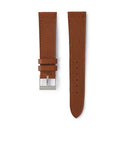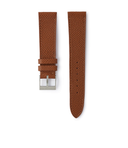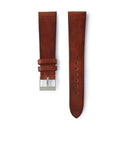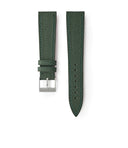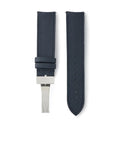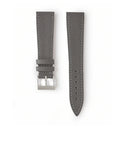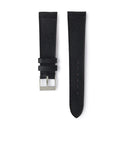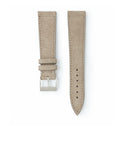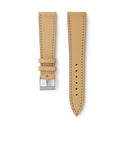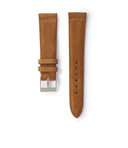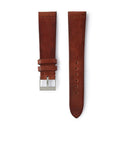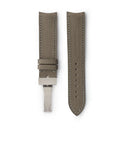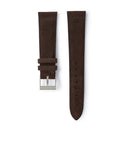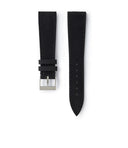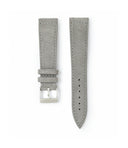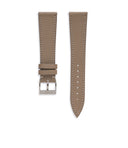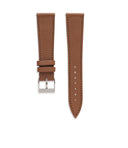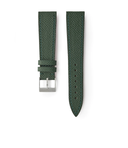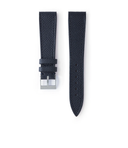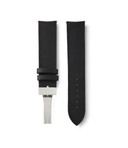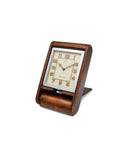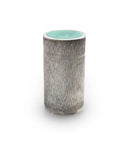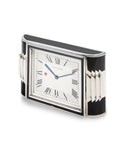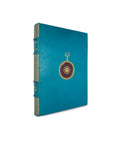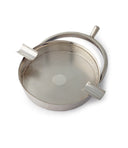Interview: William Massena
As the watch-world descends on Geneva for SIHH, and every new novelty captures our attention, we wanted to take a break from it and speak to a man whose expert eye, has seen it all. William Massena, Managing Director of Timezone and former CEO of Antiquorum, is one of the few to have had a driver-side seat when the world of watch forums took off, as auctions changed and retail evolved. We sat down with William when he recently came to London, to talk collecting, the GPHG, challenges to the watch industry and the rise of Kickstarter.
So let's get things started with an explanation of how you found yourself interested in watches?
You know, it’s kind of interesting, because I think most people have a certain moment that they fell in love with a particular watch, but I never really had that. Instead, it kind-of crept up on me slowly over time. I slowly became a watch nerd, and I’m unable to pinpoint a particular moment in time, or a specific incident that made me a watch nerd, but I just was [laughs].
And how do you define a watch nerd?
What constitutes a watch nerd is somebody who spends far, far too much time on watches…
"What constitutes a watch nerd is somebody who spends far, far too much time on watches…"
[Laughs] Right. So you began working in the banking industry before making the big change?
Yes, that’s right. I had been working in banking for some time, and twelve years ago I decided I wanted to be in the watch business.
What sorts of things did you look for in the early days of your collecting?
Well, I was looking for the ultimate watch. I wanted something that would fulfil all my fantasies and desires, all my needs in one.

What kinds of characteristics were important to you?
Number one for me was sturdiness; a lot of people don’t think too much about this, but this was important to me. It had to be reliable, and it had to be something that you could trust as a tool. Before anything else, aesthetic or otherwise, a watch is a tool, and it must be a good one which fits with your lifestyle. It should also be very precise.
"Before anything else, aesthetic or otherwise, a watch is a tool, and it must be a good one which fits with your lifestyle. It should also be very precise."
So, what was the first watch you ended up buying with your own money?
That was a Rolex Oysterquartz Datejust. I had made some money in Switzerland over the summer and so I went to Bucherer in Zurich. I walked right up to the lady in the store and told her how much money I had, and that I wanted a Rolex. She told me that she had two watches that were in my price range; one was a Milgauss reference 1019, which was soon to be discontinued...
[laughs] Wow… was it a black dial version?
You know what, I didn’t even look at the Milgauss [laughs]. She told me that it had a plastic crystal and that it was kind of a big watch. She then directed me to the other watch in my price-range, which was the Oysterquartz, which had a sapphire crystal. I remember very distinctly, she told me that you can do anything with this watch, and that I would never break the crystal. That was important to me.
Absolutely…
She also sold me on the fact that the quartz movement was far more precise than the automatic mechanical movements. I was sold, so I bought it.
It seems like this watch ticked a lot of boxes when you consider your criteria. How did your interest develop from there?
Well, I had that watch for about ten years and then when I graduated from college, I wanted to celebrate receiving my first pay-cheque by buying a new watch. This was the early ‘90s, and so I began my second hunt for a watch that matched my criteria. This research made me realise how much I enjoyed watches and just how much interest I had for them, but there was barely any information out there. It wasn’t until 1995 that TimeZone launched, and this is the moment I went down the rabbit hole.

[Laughs] What did you find?
So, I had just bought a Rolex Sea-Dweller and I had some questions about the watch, so I typed ‘Rolex Sea-Dweller’ in and found TimeZone. I then asked a question on the forum, I don’t remember what the question was exactly, but I think it was about the thickness of the bracelet or something.
Right…
Around five days passed and someone had answered my question.
This being the good old days of dial-up modems?
Yeah… there were probably about five active users back then [laughs]. I would spend maybe two or three hours a day on the TimeZone forum, asking and answering questions.
Wow, that’s a lot of time…
After a few years of this obsession, I quit my steady job and decided to open a vintage watch store in Miami and New York.
You then became the managing director of TimeZone, if we aren’t mistaken, how did that come about?
So, TimeZone was sold in the late 90s by the owner, Richard Paige, to a big company which had just gone public called Ashford.com. I had stopped contributing articles to TimeZone because I hadn’t been paid for my work there and then began contributing to Watchnet.com. Ashford went bankrupt within a year of the TimeZone purchase and so WatchNet bought them out of bankruptcy. I became the boss of TimeZone when Antiquorum bought them in 2005. Then a bit later, Antiquorum asked me if I would like to be the chief operating officer for them.
What was the presence of Antiquorum at the time?
Antiquorum had just gotten rid of Osvaldo Patrizzi because they were in some financial trouble at the time, in fact, they were on the cusp of bankruptcy. The business was big, but it was broke. I was brought on-board to keep the boat steady, which I did for three years, but then I became tired of Geneva, so I went back to New York.

Your experiences there must have given you a unique insight into the auction world. How would you say the business has evolved over the years?
Well, in the last ten years, the watch auction industry has evolved a great deal. Ten years ago, you had catalogues which were made of particularly big lots, with a lot of fillers in between. You would end up with catalogues containing maybe five or six hundred watches, with only fifty or sixty of them being important watches. There were a lot of affordable watches included, by contrast to today’s standard, which is mostly expensive and specialist watches. The inexpensive watches have all moved to online sales or with dealers.
Right…
That’s important, in my opinion, because auction houses have better margins operating like this and given the high cost of producing catalogues and organising the auction event, it makes more sense for them to be dealing with six figure watches.
"It’s a shame that not all the brands participate in the Grand Prix, because they believe in promoting Swiss watchmaking along with promoting watchmakers to the world"
You are also a member of the jury of the Grand Prix d’Horlogerie de Geneve (GPHG), how has your experience with that been?
I think the Grand Prix is the best thing that can happen in the industry right now, in a sense that we need to have an event which highlights great watches, and what it is that makes them so great. It’s a shame that not all the brands participate in the Grand Prix, because they believe in promoting Swiss watchmaking along with promoting watchmakers to the world. I think some people are scared to enter and lose, which is a real shame.
Interesting…
In the early 1930s, to the end of the Second World War, then until maybe 1975 you had really good players in the Swiss watch industry. It truly was the golden age of watchmaking, where as, all we see today is a lot of those watches performing well at auction, as well as some revival watches doing well in modern production. You have this dark-age between 1975 and 1995, then between 1995 and 2016 we have another golden age, but in a different way because the industry grew so much.
Do you think another ‘dark age’ is coming?
My concern is this exactly, I think that we’re not out of the woods and I really believe that it will be a while before there is a real turn-around. One reason for this is because it’s a very old industry, and they do not react quickly to things changing. The watch industry will survive, but it will unlikely thrive over the next ten years or so. Difficult times ahead.
Do you have any predictions as to what sorts challenges will be faced over the next five years or so?
The greatest challenge will be to excite the new generations with watches that are much more interesting to them and their lives. There is a fight for wrist-space with consumers, and unless the watch industry can adapt, it will struggle.

Do you think independent brands are in an advantageous position in some respects, being able to adapt and innovate more swiftly?
I think so, they have the ability to drive things faster than the big brands who have to act cautiously. On another level, I think people will be looking more towards things that are original, unique or made for them. People who are buying from independents like the fact that you can sit and have dinner with the watchmaker and have a more personal experience, rather than buying into a watchmaker who died 200 years ago. It’s difficult for someone to relate to Abraham-Louis Breguet personally, by comparison to a watchmaker that might be of the same generation as you.
On a slightly different topic, what do you make of SIHH and Basel World?
I’m getting the impression, or well, the rumour that Basel is getting weaker and weaker and that Geneva is getting stronger and stronger. I don’t think this has so much to do with the event itself, but the environment it’s held in. If you go to Basel, it’s very hard to get a hotel room and it’s a very boring place to be in, in terms of things to do in the evening. Geneva is more of a varied city, where you can get a nice hotel room and go out somewhere fun in the evening. It’s very important that events come a little closer to collectors rather than the distribution channel, which is slowly disappearing.
"The watch industry will survive, but it will unlikely thrive over the next ten years or so. Difficult times ahead."
Absolutely. By the way, what’s on your wrist today?
I’m wearing a strange little watch from a Kickstarter brand called Laventure, which has a brown dial and a nice design by a gentleman named Clement Gaud. I only got the watch last week and I have been wearing it ever since.
That’s the one with a kind of Nautilus-looking case, right?
Yeah, it’s kind of a Nautilus meets Hublot in terms of it having a round and flat bezel, but with a Nautilus shaped case.
On a final note, what do you think of these Kickstarter watches generally speaking?
I think Kickstarter can be a great way to start a brand; it’s a great platform for getting financing. But do I think many of them will be able to survive? I doubt it. There are a lot of people who are very engaged with it, watching the films they make to promote their vision. One can be overwhelmed with the volume of watches on there, but every once in a while, you’ll come across a gem. I have to admit, the Laventure is the first watch I have bought on Kickstarter, but it feels excellent.














